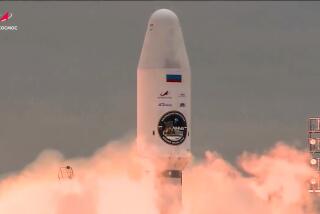Kazakhstan Gets a Bigger Say in Space Launch Site
- Share via
BAIKONUR, Kazakhstan — The Russians who run this Soviet-built cosmodrome, which launched the first man into space, once ridiculed the local Kazakhs as not fit to join in their ascents to the heavens.
The Kazakhs are no longer the brunt of ethnic jokes. A booming economy has filled their wallets with oil dollars, and this Central Asian nation is hoping to realize its own space dreams.
Kazakhstan is planning space exploration missions and an increased presence at Baikonur, which remains Russia’s main launch site for manned space flights. Set in the isolated western steppes of Kazakhstan, the base was the scene of the historic launches of the first satellite to orbit Earth and pioneer cosmonaut Yuri Gagarin.
Baikonur has gained additional importance since the U.S. space shuttle was grounded last year after the Columbia disaster, making the site the only gateway to the international space station.
Despite the collapse of the Soviet Union at the end of 1991, Russia has continued to use Baikonur -- the world’s biggest space complex -- and the complex operates virtually as a Russian enclave.
But the Kazakhs don’t just want to collect rent anymore.
“We can no longer be happy with the role of landlord,” Kazakh Foreign Minister Kasymzhomart Tokayev said earlier this year.
Kazakhstan’s independence brought often tense talks with its former Russian masters over the use of Baikonur. Finally, in 1994, a lease agreement was signed for Russia to pay $115 million a year.
Neither side was happy. The Kazakhs wanted more money, while some in the Russian military said they would prefer to walk away rather than pay anything.
When the time came this January to extend the lease, the sides clashed again. Still, they agreed to extend the lease through 2050 -- at the same rent, but with a provision for Kazakhstan to take part in future space projects.
“We’re lucky; we’ve got a cosmodrome,” said Ergazy Nurgaliyev, Kazakh President Nursultan Nazarbayev’s special representative at Baikonur. “It would be frustrating and unfair if we couldn’t make use of it.”
In 2005, Kazakhstan plans to put its own communications satellite in orbit, paying Russia about $65 million to design, build and launch it.
The Kazakhs are also forming their own squad of cosmonauts. Aidyn Aimbetov and Mukhtar Aymakhanov have been training for nearly a year at the Russian cosmonaut training center, with one of them scheduled to fly in 2006.
They hope to follow the paths of two ethnic Kazakhs already among the more than 400 people who have flown into space, about a quarter of whom were from the Soviet Union or its successor states. Tokhtar Aubakirov went aloft as a Soviet citizen, Talgat Musabayev as a Russian citizen.
Kazakhstan and Russia have also agreed to jointly develop a new launch complex for the more environmentally friendly Angara vehicle, an alternative to the Soyuz booster now in use. The estimated $400 million cost will be shared equally.
The Kazakhs have long campaigned to minimize pollution from rocket launches from their territory. The Soyuz uses poisonous fuel and the countryside is littered with the debris of burnt-out rocket stages shed as capsules soar into space.
The new complex, scheduled to be ready by the end of 2008, will have a Kazakh name: Baiterek, which means “elm tree.”
Meirbek Moldabekov, representative of Kazakhstan’s Aerospace Agency in Baikonur, remembers how unwelcome Kazakh officials felt on their first visits in the early 1990s.
“Some [Russians] laughed behind our backs, saying sarcastically: ‘Here come the masters,’ ” he said. “They didn’t trust us; they wouldn’t show us anything.”
Now, Moldabekov said, the Russians’ attitude is changing as they see the money flowing from Kazakhstan, earned from vast oil and natural gas fields that were ignored in Soviet times but are now attracting substantial Western investment.
Still, Kazakhs living in Baikonur itself complain that Russians remain dominant and say it is difficult to get residence permits that would allow them to live and work in the town. Russian police run patrols and operate checkpoints, and the Russian and Kazakh currencies are both accepted in shops.
Kazakh space officials are optimistic they will launch a spacecraft.
Umirzak Sultangazin, head of Kazakhstan’s Space Research Institute, has his experts drafting a program for scientific experiments in space to run through 2015.
More to Read
Sign up for Essential California
The most important California stories and recommendations in your inbox every morning.
You may occasionally receive promotional content from the Los Angeles Times.













